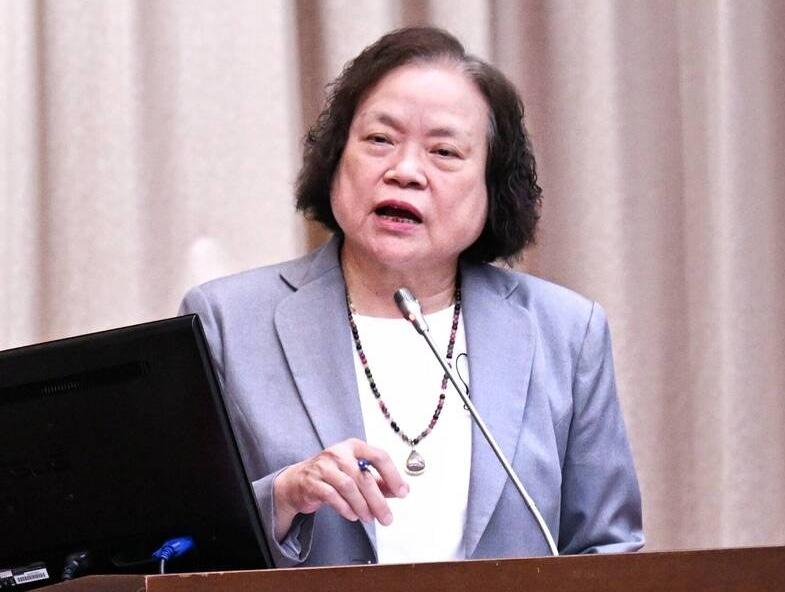The Legislative Yuan’s Finance Committee today voted to continue discussing proposed amendments that aims to require universal cash distributions if government revenues surpass the budget by a certain amount, as critics called the plan incompatible with the budget review process.
Since there is no consensus between the ruling and opposition parties and the Executive Yuan, committee members voted to keep the proposed amendment to the Budget Act (預算法) and send it to committees for further discussion.
The KMT caucus is advocating for a universal cash payment of NT$10,000 and hoping to amend the law to institutionalize “returning money to the people.”

Photo: Fang Pin-chao, Taipei Times
Chinese Nationalist Party (KMT) legislators Lai Shyh-bao (賴士葆) and Wang Hung-wei (王鴻薇) proposed amendments to Article 81-1 of the act, with the former stipulating that if tax revenue exceeds the original estimate by 20 percent, the government should implement a universal cash payment.
Wang’s proposal suggests a payment should be made if revenue exceeds the budget by NT$300 billion (US$9.1 billion).
Another version of the amendment, proposed by KMT Legislator Lin Te-fu (林德福), prioritizes using excess tax revenue to reduce government debt, expand support for disadvantaged groups and contribute to various insurance funds, with the Executive Yuan responsible for adjusting the budget accordingly.
According to the Constitution, the Legislative Yuan is responsible for reviewing the budget, not proposing it, Democratic Progressive Party (DPP) Legislator Wu Ping-jui (吳秉叡) said.
If universal cash payments are implemented, it should be done through a separate act rather than amendments to the Budget Act, DPP Legislator Wang Shih-chien (王世堅) said.
Directorate-General of Budgeting, Accounting and Statistics Minister Chen Shu-tzu (陳淑姿) said the agency does not support the proposed amendments.
The government distributed universal cash payments of NT$6,000 in 2022, which could serve as the threshold for these payments, Lin said.
However, Chen said that the cash distribution in 2022 had a special purpose.
It was designed to accelerate the economy’s recovery after the COVID-19 pandemic by encouraging consumers to spend, she said.
At that time, the economic growth rate was only 2.1 percent and the cash distribution was intended to maintain economic growth, she added.
The government would first focus on using excess tax revenue to pay debts and reduce borrowing, Deputy Minister of Finance Frank Juan (阮清華) said.
Any remaining surplus would then be allocated to the general budget, which could be used to support people’s livelihoods, disadvantaged groups and national defense, Juan said.
Additional reporting by CNA

Taiwan is stepping up plans to create self-sufficient supply chains for combat drones and increase foreign orders from the US to counter China’s numerical superiority, a defense official said on Saturday. Commenting on condition of anonymity, the official said the nation’s armed forces are in agreement with US Admiral Samuel Paparo’s assessment that Taiwan’s military must be prepared to turn the nation’s waters into a “hellscape” for the Chinese People’s Liberation Army (PLA). Paparo, the commander of the US Indo-Pacific Command, reiterated the concept during a Congressional hearing in Washington on Wednesday. He first coined the term in a security conference last

Prosecutors today declined to say who was questioned regarding alleged forgery on petitions to recall Democratic Progressive Party (DPP) legislators, after Chinese-language media earlier reported that members of the Chinese Nationalist Party (KMT) Youth League were brought in for questioning. The Ministry of Justice Investigation Bureau confirmed that two people had been questioned, but did not disclose any further information about the ongoing investigation. KMT Youth League members Lee Hsiao-liang (李孝亮) and Liu Szu-yin (劉思吟) — who are leading the effort to recall DPP caucus chief executive Rosalia Wu (吳思瑤) and Legislator Wu Pei-yi (吳沛憶) — both posted on Facebook saying: “I

The Ministry of Economic Affairs has fined Taobao NT$1.2 million (US$36,912) for advertisements that exceed its approved business scope, requiring the Chinese e-commerce platform to make corrections in the first half of this year or its license may be revoked. Lawmakers have called for stricter enforcement of Chinese e-commerce platforms and measures to prevent China from laundering its goods through Taiwan in response to US President Donald Trump’s heavy tariffs on China. The Legislative Yuan’s Finance Committee met today to discuss policies to prevent China from dumping goods in Taiwan, inviting government agencies to report. Democratic Progressive Party Legislator Kuo Kuo-wen (郭國文) said

The Ministry of Economic Affairs has fined Taobao NT$1.2 million (US$36,900) for advertisements that exceeded its approved business scope and ordered the Chinese e-commerce platform to make corrections in the first half of this year or its license would be revoked. Lawmakers have called for stricter supervision of Chinese e-commerce platforms and more stringent measures to prevent China from laundering its goods through Taiwan as US President Donald Trump’s administration cracks down on origin laundering. The legislature’s Finance Committee yesterday met to discuss policies to prevent China from dumping goods in Taiwan, inviting government agencies to report on the matter. Democratic Progressive Party